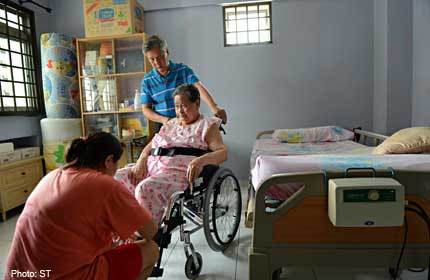Protecting those who can't speak for themselves


SINGAPORE - Mr Tan Cheow Tee (above in blue) found out that getting a court order to act for his mother was both time-consuming and expensive.
This is why the factory manager and his wife have registered a legal document called lasting power of attorney (LPA) with the Office of the Public Guardian.
This allows the persons they have named - two of their children - to legally make decisions on the couple's behalf should they become mentally incapacitated, without the hassle of getting a court order.
They are among 3,200 people who have done so since the office was set up in March 2010.
Mr Tan's move was sparked off by what happened to his mother.
Madam Khoo Joo Tiang, now 88, suffered a stroke eight years ago. She was then living with a maid and the incident left her paralysed on her right side and unable to talk.
Her nine children considered putting her in a nursing home. They finally decided that she would stay with Mr Tan, 59, who lives in a five-room executive flat in Choa Chu Kang with his wife and children.
Madam Khoo's three-room flat in Redhill was rented out for over $1,800 a month which came in handy to pay for her regular medical check-ups and medication.
Early last year, the Redhill residents decided to cash in on their lucrative site by going en bloc. The family decided that Mr Tan and one of his brothers should act for their mother.
But a family agreement alone was not enough. A court order was needed to give them the power to act on her behalf. All her children, grandchildren over age 21 and her two surviving siblings had to agree.
They had to hire a lawyer who charged more than $8,000, among other procedures.
It took six months to get all the paperwork in order.
For Mr N. Mahtani, the decision to apply for an LPA to act for his uncle, who has no children and had suffered a stroke four years ago, turned out to be a smart move.
His uncle, who lived in Spain with his French wife, would return for visits. The day after he came back in September last year, he suffered another stroke and has been in hospital since.
With the LPA, Mr Mahtani, who is in his late 50s, was able to get his uncle's bank to release funds to pay for treatment.
However, the lawyer said that even with the LPA card and a letter from the hospital to confirm that his uncle is no longer capable of giving instructions himself, it took the bank three weeks to release the money.
"Financial institutions here must come up to speed, because in cases like this, we need the funds for his treatment fairly quickly," he said.
The hospital, however, was familiar with the LPA and allowed him to apply to use his uncle's Medisave funds for treatment.
Both Mr Mahtani and his wife intend to get an LPA done too.
Mr Richard Magnus, chairman of the Public Guardian Board, said it is not just the elderly who can benefit from making an LPA.
More than 50 per cent of court orders to appoint a person to act on behalf of someone were linked to people who had lost their mental capacity through conditions that were not age-related, he noted.
They could be accident victims or suffer from some mental disorder.
Encouraging everyone to make an LPA, he added: "These statistics show us how life can be fraught with uncertainties."
The Office of the Public Guardian was set up when the The Mental Capacity Act came into effect on March 1, 2010.
A division of the Ministry of Social and Family Development, it is tasked with enabling and protecting people who are no longer able to act for themselves.
This includes maintaining a register of Lasting Power of Attorney (LPA).
Anyone who is over 21 and in full command of his faculties can register an LPA.
This allows one or more people named to act for the person in terms of his personal and/or financial welfare, as stipulated in the LPA.
If the person loses mental capacity, such as after suffering from a stroke, the person or persons named can make decisions on his behalf. This includes accessing his banking accounts.
The LPA becomes active only with medical certification that the person is not capable of making decisions - either because the person suffers from severe dementia, is in a coma, or is incapacitated.
Should the person later recover, he takes his affairs back into his own hands.
The person making an LPA needs to get either a lawyer, a commissioner for oaths, a psychiatrist or one of 71 named doctors to certify that he is able to understand and agrees to register the LPA.

Get a copy of The Straits Times or go to straitstimes.com for more stories.